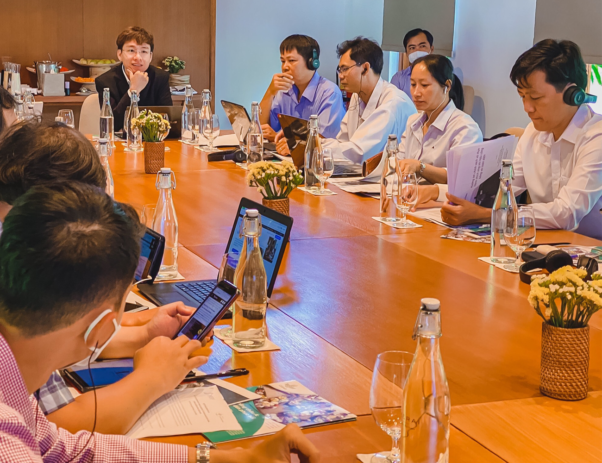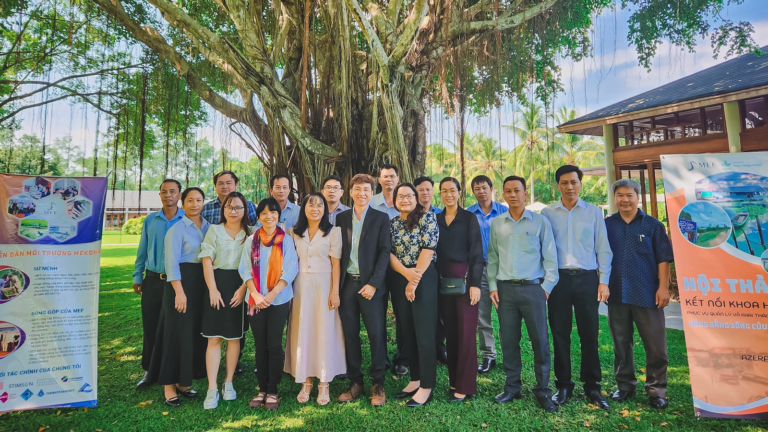As climate change raises the risks that people, farms and ecosystems face across the globe, few areas are more vulnerable than river deltas, which are suffering increased flooding, storms, soil salination, and other challenges. The most populated and threatened are the massive deltas of Asia, which are home to more to tens of millions and vital for the food security of many millions more. This is why CGIAR launched a Research Initiative on Securing the Food Systems of Asian Mega-Deltas for Climate and Livelihood Resilience, or Asian Mega-Deltas (AMD).
Representatives of CGIAR, national governments and an array of partner organizations have begun a process of dialogue and knowledge sharing to facilitate concerted, holistic, and sustainable solutions to the challenges and respond to opportunities in Asia’s mega-deltas.
One such meeting, the ‘Science Connections for Better Governance and Sustainable Development in the Mekong Delta’ policy dialogue was held in Can Tho City, Vietnam, on November 30, 2022. The event was designed to increase awareness and build the science-based decision-making capacity among provincial officials in the Mekong Delta, the CGIAR Initiative on Securing the Food Systems of Asian Mega-Deltas for Climate and Livelihood Resilience (AMD), and the Mekong Environment Forum.
More than 30 provincial government officials, international and local researchers, and solution providers participated both in person and virtually. The policy dialogue provided a platform for conversations with the aim of developing a shared understanding of the latest information on the environmental challenges that confront the Mekong Delta. Participants worked together to identify good practices and opportunities for enhanced action and support, and find creative ways to overcome barriers and challenges based on equity and the best available science.
Current research in the Delta
 During the event, speakers shared the latest research findings on topics concerning the Mekong Delta, including environmental change, agricultural transformation, and environmental governance.
During the event, speakers shared the latest research findings on topics concerning the Mekong Delta, including environmental change, agricultural transformation, and environmental governance.
Dr. G. Mathias Kondolf, senior researcher at UC Berkeley, described ways to control the drivers of land loss in the Mekong Delta. He emphasized that “deltas are such important systems ecologically, economically, and socially; however, it is very difficult for decision makers and the public to comprehend their fragility.”
His recommendations for the Mekong Delta include avoiding high-impact dams, passing sediment through or around dams, phasing out riverbed sand mining, transforming agriculture in the Delta, maintaining connectivity across the Delta floodplain, and leveraging nature-based solutions.
Dr. Rafael Schmitt, senior scientist at Stanford University, presented a strategic trade-off analysis for reducing dam impacts on the Mekong’s sediment budget. He stressed that dams were mostly built without strategic environmental considerations. As a recommendation, he indicated that dam impact can be reduced through strategic planning (i.e., concentrate dams in “working rivers” that contribute less sediment).
Alternative technologies and practices
The event also aimed to provide opportunities for collaboration between researchers, solution providers, and local governments in solving key priorities and challenges using new and innovative technologies and practices.
Dr. Hans Hendriks, director of Millennium Bio-Energy, described an innovative system that collects and processes biomass and agricultural by-products, particularly water hyacinth, to generate electricity, bio-fertilizer, and drinking water. The technology could be valuable across the Mekong Delta because it is proven to reduce water weed below harmful levels resulting in reduced mosquito-borne diseases like malaria, Zika, and dengue, restored fish populations, and improved water quality. It is also self-sustaining and profitable and can support the local energy supply.
To address flooding in the Delta, Dr. Miguel Laverde, the HYDRAFloods lead, gave a presentation to introduce this tool and its service in SERVIR-Mekong. The HYDRAFloods tool is a publicly available, web-based, near real-time flood monitoring tool. It is designed to improve flood monitoring systems using freely available satellite remote sensing data. Dr. Laverde described how the tool helps emergency response and relief sectors by providing more accurate flood information.
Towards equitable and inclusive policies and practices
The policy dialogue highlighted the importance of equitable and inclusive climate adaptation policies and practices to address challenges across the Mekong Delta. Dr. Nozomi Kawarazuka, the gender focal point of the AMD Initiative and social scientist at the International Potato Center, emphasized the importance of looking at issues through a lens of gender and social diversities and thus paying attention to differences, inequality, and power dynamics among farmers.
Women farmers’ perspectives and needs are often forgotten in the process of technology development and dissemination. Dr. Kawarazuka stressed that “women-oriented technologies and adaptation strategies can help strengthen resilience to climate change at the community level.”
Dr. Kawarazuka also explained that climate adaptation strategies are designed for the majority group and minority people tend to be left behind. She added that the impacts of climate change and environmental change on the various vulnerable sectors are very different. As a consequence, she recommended that diverse options be considered in climate adaptation strategies for minority social groups who directly depend on natural resources and have limited land and assets. She pointed out that the root causes of global problems of gender inequality and climate change are the same and “we can address both by changing the (food) systems”.

Written by Eisen Bernardo (AMD Communication consultant)
